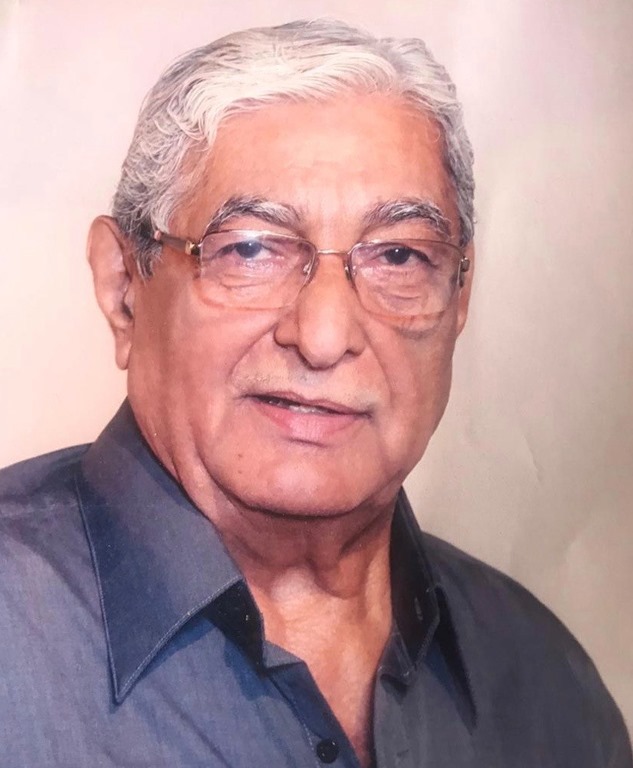Our second author in the Everyday Parsi 2020 series is Feroze Jamshedji Unwalla from Mumbai, India.
Feroze Jamshedji Unwalla writes…
My earliest memories of Muktad, in the mid-1940s, were of accompanying my parents and siblings to Daman from Udvada, where we lived. My Bapawaji , Ervad Hormusji .J. Unwalla , the Panthaki of the Daman Dar-E-Mehr, was highly respected not only by the Parsees in Daman but all the other communities who were then under the Portuguese rule. Muktad, observed for 18 days then, was a time our family; my father, Ervad Jamshedji Unwalla and two of my Kakas, Ervad Dadiba Unwalla and Ervad Pestonji Unwalla, performed ceremonies/ prayers together for not only the dearly departed of our family but also the Parsee community residing in Daman.
The day would begin at 2am with the women cleaning the Karasya/Vase while the menfolk would fetch water from the well. The karasya/vase would be then arranged on the marble tables allocated to each of the families with flowers from the Agiary compound. My mother, Goolbanoo Unwalla, and other women of our family would then start preparing the sweets to be offered at the prayers while the men (Mobeds) got ready with arrangements of the fruits etc. I was particularly keen on observing the rituals and would wake up early to watch everyone dedicatedly perform their duties even as my mother would force me to go back to sleep.

The taste of the delicacies malido, papri, bhakra, etc. prepared by the women in our family, is difficult to forget as also the effort they would put in to ensure that it was befitting to be offered for the prayers. As my father and Kakas would be busy with prayers, I would be impatiently waiting for my Bapawaji to take me to the market as was his daily routine.
On the first day of the Gatha, we would be up at 11pm to start prayers at 12am and the same on New Year and Khordad Saal to conclude all the ceremonies. I recollect vividly, my mother and the other women of our family working together to prepare food for the Satum prayers; from drawing water from the well to performing all the chores as a unit. The bond they shared was obvious, even as they laughed and joked while they would unwind at the end of a tiring day.
On completion of Muktad, the karasya/vases were cleaned, my siblings, cousins and I would volunteer to personally return the items to the families who had offered prayers as was the practice. Since we were aware that we would get tipped by a few of them we would compete to get sent to those houses. On the concluding day i.e. Amardad Saal we would be spoilt for choice with the variety of food that would be laid out. Through the years, food also became part of the memories of Muktad.
On becoming a Navar at the age of 13, under the direct guidance of my father, my first experience of performing ceremonies at Muktad was at the Batliwalla Agiary in Tardeo. As much as it was a great learning, as young priests we felt overworked. Prayers would commence at 5am upto 1230pm and on Gatha days upto 130pm. Jashans would then commence at 2pm followed by Satum ceremonies. The Satum ceremony was performed thrice during the day leaving us exhausted by the end of the day. We continued our religious and secular education at the M.F. Cama Athornan Madressa in Andheri.
I had the privilege of working at several Agiary’s during Muktad as well as otherwise; Ashburner Agiary at Khetwadi where my Fua, Ervad Novroji Unwalla was a Panthaki; Patel Agiary at Mazagaon where my mama, Edulji Bhadha worked and in Daman when I had to stand in for my father who was assigned duties to perform the Boi to Iranshah in Udvada. According to the Udvada Anjuman, the 9 Athornan families are assigned to perform the Boi to Iranshah. Every family was given a month and the 30 days were further divided amongst the families as per the number of members. Our family used to get the privilege every nine months and on many an occasion would happen to be during the last four days of Muktad. My father would leave to undertake his duties at Iranshah on the assurance that me and my brother, Bomy Unwalla, would fill in during his four day absence. It was always a fulfilling experience to be able to perform the ceremonies alongside family during Muktad.
Muktad also took us to Chinoy Agiary in Secunderabad where for many years my brother-in-law Ervad Noshir Dastoor served as Panthaki. My brother and I besides other Mobed’s from Mumbai would offer our services during Muktad for many years which was initially over 18 days and then became 10 days. It became our second home with two of my sisters moving there and the love we received from the community residing in the Agiary premises. We served at the Chinoy Agiary during Muktad until a couple of years after the passing of our father and brother-in-law under Ervad Darabshaw Bhatela, who was also my brother-in-law. The experience was a memorable one; of music programmes that were organized to facilitate bonding and for recreation and the pampering by my sisters.
My Muktad memories are among those I most cherish; of my parents and extended families dedicated to collectively serving our community and the togetherness we experienced in the process!
Feroze Jamshedji Unwalla, residing in Mumbai, hails from a family of priests who have served the community over generations.
